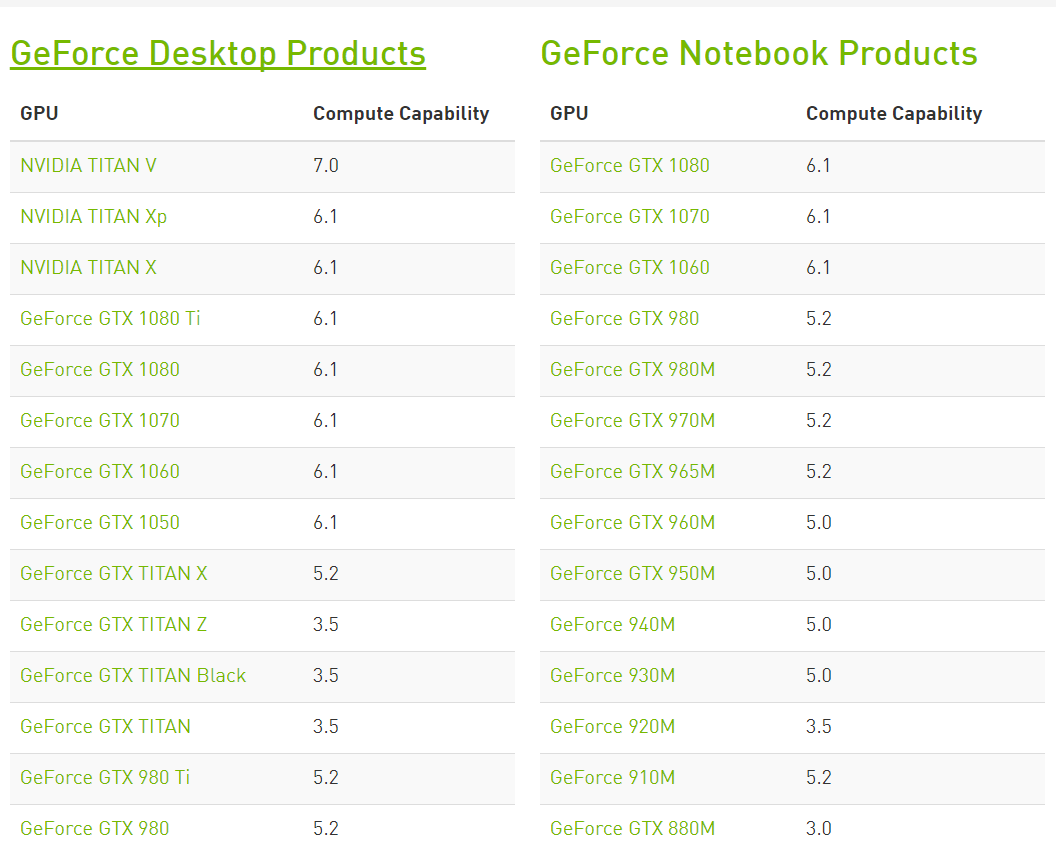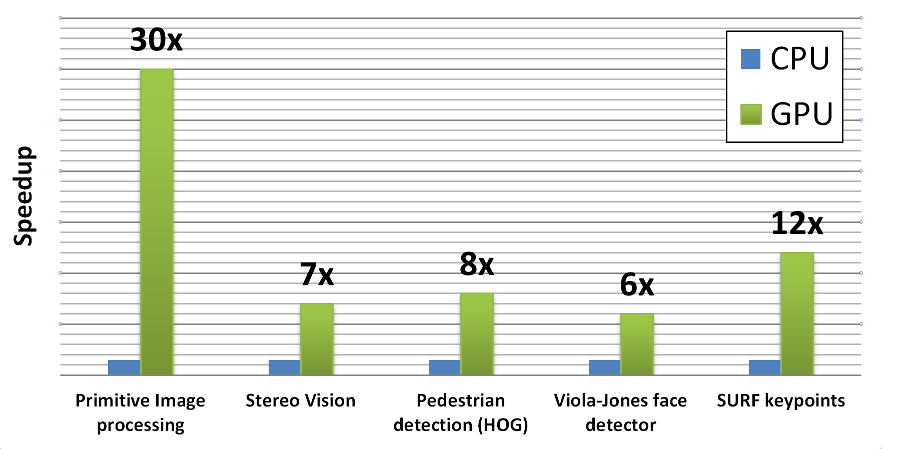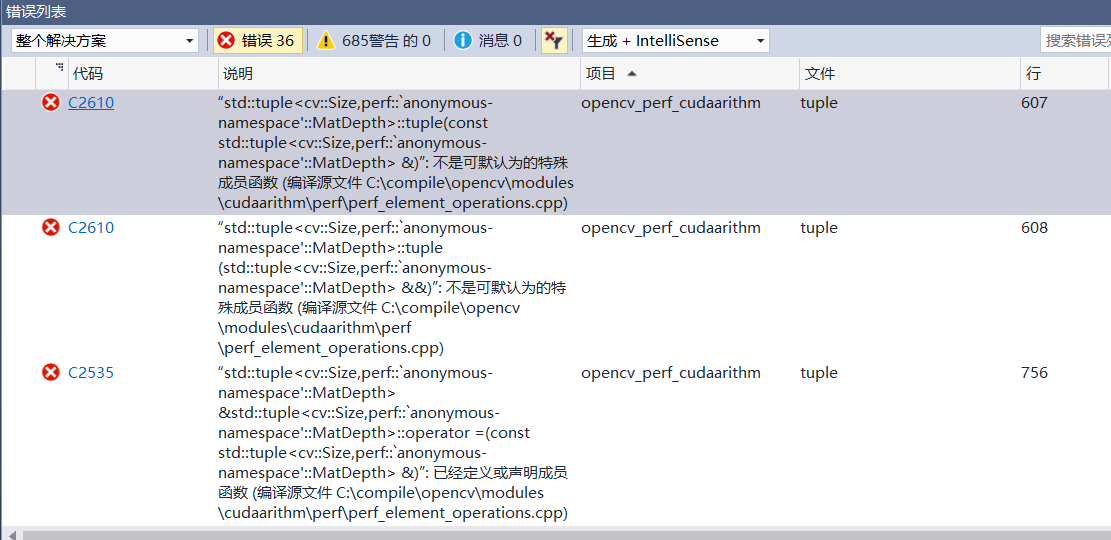This article starts from personal blog https://kezunlin.me/post/6580691f/ Welcome to read!
compile opencv with CUDA support on windows 10
Series
- Part 1: compile opencv on ubuntu 16.04
- Part 2: compile opencv with CUDA support on windows 10
- Part 3: opencv mat for loop
- Part 4: speed up opencv image processing with openmp
Guide
requirements:
- windows: 10
- opencv: 3.1.0
- nvidia driver: gtx 1060 382.05 (gtx 970m)
- GPU arch(s): sm_61 (sm_52)
- cuda: 8.0
- cudnn: 5.0.5
- cmake: 3.10.0
- vs: vs2015 64
nvidia cuda CC
There is a gap between the computing power of the notebook version of the graphics card and that of the desktop.

cpu vs gpu
for opencv functions

get source
Get opencv 3.1.0 for git and fix some bugs
git clone https://github.com/opencv/opencv.git cd opencv git checkout -b v3.1.0 3.1.0 # fix bugs for 3.1.0 git cherry-pick 10896 git cherry-pick cdb9c git cherry-pick 24dbb git branch master * v3.1.0
compile
mkdir build && cd build && cmake-gui ..
config
configure with VS 2015 win64 with options
BUILD_SHARED_LIBS ON CMAKE_CONFIGURATION_TYPES Release # Release CMAKE_CXX_FLAGS_RELEASE /MD /O2 /Ob2 /DNDEBUG /MP # for multiple processor WITH_VTK OFF BUILD_PERF_TESTS OFF # if ON, build errors occur WITH_CUDA ON CUDA_TOOLKIT_ROOT_DIR C:/Program Files/NVIDIA GPU Computing Toolkit/CUDA/v8.0 #CUDA_ARCH_BIN 3.0 3.5 5.0 5.2 6.0 6.1 # very time-consuming CUDA_ARCH_PTX 3.0
for opencv

CUDA_ARCH_BIN 3.0 3.5 5.0 5.2 6.0 6.1 relate with
-gencode;arch=compute_30,code=sm_30;-gencode;arch=compute_35,code=sm_35;-gencode;arch=compute_50,code=sm_50;-gencode;arch=compute_52,code=sm_52;-gencode;arch=compute_60,code=sm_60;-gencode;arch=compute_61,code=sm_61;
CUDA_ARCH_PTX 3.0 relate with
-gencode;arch=compute_30,code=compute_30;
for caffe

the CUDA_ARCH_BIN parameter specifies multiple architectures so as to support a variety of GPU boards. otherwise, cuda programs will not run with other type of GPU boards. In order to support running executable programs on multiple GPUs with different computing power, opencv/caffe needs to support multiple different architectures in the compilation process, eg. CUDA ﹣ arch ﹣ bin 3.03.55.05.26.06.01, so the compilation process is very time-consuming. In the process of compilation, try to select the GPU architecture that needs to release release version for configuration compilation.
configure and output:
Selecting Windows SDK version 10.0.14393.0 to target Windows 10.0.17134. found IPP (ICV version): 9.0.1 [9.0.1] at: C:/compile/opencv/3rdparty/ippicv/unpack/ippicv_win CUDA detected: 8.0 CUDA NVCC target flags: -gencode;arch=compute_30,code=sm_30;-gencode;arch=compute_30,code=compute_30 Could NOT find Doxygen (missing: DOXYGEN_EXECUTABLE) To enable PlantUML support, set PLANTUML_JAR environment variable or pass -DPLANTUML_JAR=<filepath> option to cmake Could NOT find PythonInterp: Found unsuitable version "1.4", but required is at least "3.4" (found C:/Users/zunli/.babun/cygwin/bin/python) Could NOT find PythonInterp: Found unsuitable version "1.4", but required is at least "3.2" (found C:/Users/zunli/.babun/cygwin/bin/python) Could NOT find Matlab (missing: MATLAB_MEX_SCRIPT MATLAB_INCLUDE_DIRS MATLAB_ROOT_DIR MATLAB_LIBRARIES MATLAB_LIBRARY_DIRS MATLAB_MEXEXT MATLAB_ARCH MATLAB_BIN) General configuration for OpenCV 3.1.0 ===================================== Version control: 3.1.0-3-g5e9beb8 Platform: Host: Windows 10.0.17134 AMD64 CMake: 3.10.0 CMake generator: Visual Studio 14 2015 Win64 CMake build tool: C:/Program Files (x86)/MSBuild/14.0/bin/MSBuild.exe MSVC: 1900 C/C++: Built as dynamic libs?: YES C++ Compiler: C:/Program Files (x86)/Microsoft Visual Studio 14.0/VC/bin/x86_amd64/cl.exe (ver 19.0.24215.1) C++ flags (Release): /DWIN32 /D_WINDOWS /W4 /GR /EHa /D _CRT_SECURE_NO_DEPRECATE /D _CRT_NONSTDC_NO_DEPRECATE /D _SCL_SECURE_NO_WARNINGS /Gy /bigobj /Oi /wd4251 /wd4324 /wd4275 /wd4589 /MP8 /MD /O2 /Ob2 /DNDEBUG /MP /Zi C++ flags (Debug): /DWIN32 /D_WINDOWS /W4 /GR /EHa /D _CRT_SECURE_NO_DEPRECATE /D _CRT_NONSTDC_NO_DEPRECATE /D _SCL_SECURE_NO_WARNINGS /Gy /bigobj /Oi /wd4251 /wd4324 /wd4275 /wd4589 /MP8 /MDd /Zi /Ob0 /Od /RTC1 C Compiler: C:/Program Files (x86)/Microsoft Visual Studio 14.0/VC/bin/x86_amd64/cl.exe C flags (Release): /DWIN32 /D_WINDOWS /W3 /D _CRT_SECURE_NO_DEPRECATE /D _CRT_NONSTDC_NO_DEPRECATE /D _SCL_SECURE_NO_WARNINGS /Gy /bigobj /Oi /MP8 /MD /O2 /Ob2 /DNDEBUG /Zi C flags (Debug): /DWIN32 /D_WINDOWS /W3 /D _CRT_SECURE_NO_DEPRECATE /D _CRT_NONSTDC_NO_DEPRECATE /D _SCL_SECURE_NO_WARNINGS /Gy /bigobj /Oi /MP8 /MDd /Zi /Ob0 /Od /RTC1 Linker flags (Release): /machine:x64 /INCREMENTAL:NO /debug Linker flags (Debug): /machine:x64 /debug /INCREMENTAL Precompiled headers: YES Extra dependencies: comctl32 gdi32 ole32 setupapi ws2_32 vfw32 cudart nppc nppi npps cufft -LC:/Program Files/NVIDIA GPU Computing Toolkit/CUDA/v8.0/lib/x64 3rdparty dependencies: zlib libjpeg libwebp libpng libtiff libjasper IlmImf OpenCV modules: To be built: cudev core cudaarithm flann imgproc ml video cudabgsegm cudafilters cudaimgproc cudawarping imgcodecs photo shape videoio cudacodec highgui objdetect ts features2d calib3d cudafeatures2d cudalegacy cudaobjdetect cudaoptflow cudastereo stitching superres videostab python2 Disabled: world Disabled by dependency: - Unavailable: java python3 viz Windows RT support: NO GUI: QT: NO Win32 UI: YES OpenGL support: NO VTK support: NO Media I/O: ZLib: build (ver 1.2.8) JPEG: build (ver 90) WEBP: build (ver 0.3.1) PNG: build (ver 1.6.19) TIFF: build (ver 42 - 4.0.2) JPEG 2000: build (ver 1.900.1) OpenEXR: build (ver 1.7.1) GDAL: NO Video I/O: Video for Windows: YES DC1394 1.x: NO DC1394 2.x: NO FFMPEG: YES (prebuilt binaries) codec: YES (ver 56.41.100) format: YES (ver 56.36.101) util: YES (ver 54.27.100) swscale: YES (ver 3.1.101) resample: NO gentoo-style: YES GStreamer: NO OpenNI: NO OpenNI PrimeSensor Modules: NO OpenNI2: NO PvAPI: NO GigEVisionSDK: NO DirectShow: YES Media Foundation: NO XIMEA: NO Intel PerC: NO Parallel framework: Concurrency Other third-party libraries: Use IPP: 9.0.1 [9.0.1] at: C:/compile/opencv/3rdparty/ippicv/unpack/ippicv_win Use IPP Async: NO Use Eigen: NO Use Cuda: YES (ver 8.0) Use OpenCL: YES Use custom HAL: NO NVIDIA CUDA Use CUFFT: YES Use CUBLAS: NO USE NVCUVID: NO NVIDIA GPU arch: 30 35 50 52 60 61 NVIDIA PTX archs: 30 Use fast math: NO OpenCL: Version: dynamic Include path: C:/compile/opencv/3rdparty/include/opencl/1.2 Use AMDFFT: NO Use AMDBLAS: NO Python 2: Interpreter: C:/Python27/python.exe (ver 2.7.13) Libraries: C:/Python27/libs/python27.lib (ver 2.7.13) numpy: C:/Python27/lib/site-packages/numpy/core/include (ver 1.11.3) packages path: C:/Python27/Lib/site-packages Python 3: Interpreter: NO Python (for build): C:/Python27/python.exe Java: ant: NO JNI: C:/Program Files/Java/jdk1.8.0_161/include C:/Program Files/Java/jdk1.8.0_161/include/win32 C:/Program Files/Java/jdk1.8.0_161/include Java wrappers: NO Java tests: NO Matlab: Matlab not found or implicitly disabled Documentation: Doxygen: NO PlantUML: NO Tests and samples: Tests: YES Performance tests: NO C/C++ Examples: NO Install path: C:/compile/opencv/build/install cvconfig.h is in: C:/compile/opencv/build ----------------------------------------------------------------- Configuring done Generating done
Notice for gencode
CUDA NVCC target flags: -gencode;arch=compute_30,code=sm_30;-gencode;arch=compute_35,code=sm_35;-gencode;arch=compute_50,code=sm_50;-gencode;arch=compute_52,code=sm_52;-gencode;arch=compute_60,code=sm_60;-gencode;arch=compute_61,code=sm_61;-gencode;arch=compute_30,code=compute_30
build
Open OpenCV.sln with VS 2015 and build release version.
this may take hours to finish.

errors

possible solutions
With
BUILD_PERF_TESTSandBUILD_TESTSdisabled, I managed to build OpenCV 3.1 with CUDA 8.0 on Windows 10 with VS2015 x64 arch target. Without building test/performance modules, the build process costs less time as well : )
I actually got it to work both on my laptop and my desktop (GTX960M and GTX970 respectively) running with OpenCV 3.2 and the latest version of CUDA 8.0 for Win10 in Visual Studio 15 Community! What I did was to enable
WITH_CUBLASaswell asWITH_CUDA. I also turned offBUILD_PERF_TESTSandBUILD_TESTS. The configuration was built using the Visual Studio 14 2015 C++ compiler.
my solution:
disable `BUILD_PERF_TESTS`

configure and build again. this time cost only about 1 minutes.
after error fixed,build results

demo
cuda-module
OpenCV GPU module is written using CUDA, therefore it benefits from the CUDA ecosystem.
GPU modules includes class cv::cuda::GpuMat which is a primary container for data kept in GPU memory. It's interface is very similar with cv::Mat, its CPU counterpart. All GPU functions receive GpuMat as input and output arguments. This allows to invoke several GPU algorithms without downloading data. GPU module API interface is also kept similar with CPU interface where possible. So developers who are familiar with Opencv on CPU could start using GPU straightaway.
The GPU module is designed as a host-level API. This means that if you have pre-compiled OpenCV GPU binaries, you are not required to have the CUDA Toolkit installed or write any extra code to make use of the GPU.
CMakeLists.txt
find_package(OpenCV REQUIRED COMPONENTS core highgui imgproc features2d calib3d cudaarithm cudabgsegm cudafilters cudaimgproc cudawarping cudafeatures2d # for cuda-enabled ) # MESSAGE( [Main] " OpenCV_INCLUDE_DIRS = ${OpenCV_INCLUDE_DIRS}") MESSAGE( [Main] " OpenCV_LIBS = ${OpenCV_LIBS}")
demo.cpp
In the sample below an image is loaded from local file, next it is uploaded to GPU, thresholded, downloaded and displayed.
#include <opencv2/cudaarithm.hpp> #include <opencv2/cudabgsegm.hpp> #include <opencv2/cudafilters.hpp> #include <opencv2/cudaimgproc.hpp> #include <opencv2/cudawarping.hpp> #include <opencv2/cudafeatures2d.hpp> int test_opencv_gpu() { try { cv::Mat src_host = cv::imread("file.png", CV_LOAD_IMAGE_GRAYSCALE); cv::cuda::GpuMat dst, src; src.upload(src_host); cv::cuda::threshold(src, dst, 128.0, 255.0, CV_THRESH_BINARY); cv::Mat result_host; dst.download(result_host); cv::imshow("Result", result_host); cv::waitKey(); } catch (const cv::Exception& ex) { std::cout << "Error: " << ex.what() << std::endl; } return 0; }
cpu vs gpu time cost
- (1) for the ORB feature matching between pictures with low resolution, the CPU runs faster than the GPU Version (because it takes time for the image to be uploaded to the GPU)
- (2) for the image with larger resolution or the machine with better GPU than CPU (such as Nvidia Jetson Series), the ORB algorithm of GPU is more efficient than that of CPU.
problems
(1) the first creation of opencv caffe network using cuda version is very time-consuming, and the latter is very fast. (2) the GPU code of OpenCV is slower than that of cpu, and it takes about 20 seconds to start the first time. (the fact is that compiled caffe and GPU computing forces do not match)
reasons
Your problem is that CUDA needs to initialize! And it will generally takes between serveral seconds
Why first function call is slow? That is because of initialization overheads. On first GPU function call
Cuda Runtime APIis initialized implicitly.
The first gpu function call is always takes more time, because CUDA initialize context for device. The following calls will be faster.
Not Reasons: (1) CPU clockspeed is 10x faster than GPU clockspeed. (2) memory transfer times between host (CPU) and device (GPU) (upload,downloa data)
deploy
runtime errors
opencv caffe compiled by gtx 1060 runs on gtx 970m with errors
im2col.cu Check failed: error == cudaSuccess (8 vs. 0) invalid device function
gtx 1060 sm_61 gtx 970m sm_52
im2col is the source file of caffe, which indicates that the computing power of gtx 970m does not support the running of executable files.
reasons
see what-is-the-purpose-of-using-multiple-arch-flags-in-nvidias-nvcc-compiler
Roughly speaking, the code compilation flow goes like this:
CUDA C/C++ device code source --> PTX --> SASS
The virtual architecture (e.g.
compute_20, whatever is specified by-arch compute...) determines what type of PTX code will be generated. The additional switches (e.g.-code sm_21) determine what type of SASS code will be generated. SASS is actually executable object code for a GPU (machine language). An executable can contain multiple versions of SASS and/or PTX, and there is a runtime loader mechanism that will pick appropriate versions based on the GPU actually being used.
win7/win10 deploy
- compile opencv caffe on windows 10 for GTX 1060
- deoply on windows 7 for GTX 1080 Ti successfully
for win7, if we install 398.82-desktop-win8-win7-64bit-international-whql.exe,errors may occur:
> nvidia-smi.exe Failed to initialize NVML: Unknown error
Solutions: use older drivers 385.69
linux/window performance
(1) the average time of API in linux is 3ms; the average time of the same code in windows is 14ms (2) the performance difference between before and after code optimization is close to 5 times, 125ms vs 25ms (3) cmake compile RELEASE option has enabled code optimization-O3 by default
Reference
- Building OpenCV for Tegra with CUDA
- opencv with cuda introduction
- ref doc for opencv gpu
- opencv 3.1.0 doc
- std::tuple errors when Building OpenCV (Main Branch) for Microsoft VS 2015 (x64)
- opencv github issues
- building-opencv-3-cuda-errors
- why-opencv-gpu-code-is-slower-than-cpu
- huge-time-to-upload-data-to-gpu
- https://github.com/floydhub/dl-docker/issues/12
- Cuda kernel failed. Error: invalid device function
- offical cuda-c-programming-guide
- what-is-the-purpose-of-using-multiple-arch-flags-in-nvidias-nvcc-compiler
History
- 20180713: created.
Copyright
- Post author: kezunlin
- Post link: https://kezunlin.me/post/6580691f/
- Copyright Notice: All articles in this blog are licensed under CC BY-NC-SA 3.0 unless stating additionally.